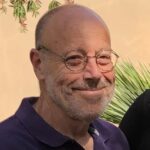With formal graduate training complete except for my dissertation, my wife and I moved from Nashville to New Jersey in the mid-1980’s (it was her turn to uproot us for graduate study—in this case for law school), and my first job was at the NJ Self-Help Group Clearinghouse. This state-wide agency was the first of its kind nationally to become computerized, and it helped people find and form a wide range of support groups for all types of human situations, both health-related and other. The work gave me a focus for my dissertation, and it helped me to appreciate two very different — but sometimes overlapping — paradigms of helping:
- mutual help, based essentially on lived experience, compassion, and shared meaning, and
- professional help, based essentially on formal education, training and credentialing.
Moreover, my time at the Clearinghouse connected me to two communities which ended up comprising a major focus of my professional life.
One was the mental health “self-help” consumer movement, which since the 1970’s was re-framing the traditional concept of passive psychiatric patients being “treated” by professionals into a more dynamic model of active, empowered, and self-directing consumers of mental health services playing a greater role in shaping their own treatment. Psychiatric rehabilitation practitioners will recognize this as both the beginning of consumer-operated services and perhaps one of the key precursors of the whole recovery movement. For me, it became a setting in which I participated as a professional “on tap, not on top,” helping several state-wide consumer-operated programs to form and develop, one of which kept me on the Board from when we started it in 1986 to my departure from New Jersey. That is CSP-NJ, Inc., now one of the largest consumer-operated programs in the nation, with an annual budget in excess of $15 million.
The other community — less defined but similarly marginalized — was the growing number of individuals and families who were dealing with HIV and AIDS. As an emerging epidemic–both in GLBTQ communities and in the poor, urban centers of northern New Jersey–HIV was bringing both health care providers and patients into uncharted and socially complex territory. My role as a state-wide consultant to the many self-help groups and organizations that were forming to deal with it established me as an expert in the field, and then as the need for culturally-sensitive mental health services became increasingly evident, I became someone who was sought out to deliver these, both in agency settings and in my own private practice.
Details of my work in these two communities are available elsewhere on this website, but suffice it to say that my experience with them has given me extraordinary access to and understanding of these two marginalized and stigmatized populations. I feel honored to have been able to play the roles that I have, and proud that I was able to provide psychotherapy and clinical consultation to people whose demographics historically labeled them as “not good candidates” for it.



 Andy Bernstein, PhD, CPRP
Andy Bernstein, PhD, CPRP